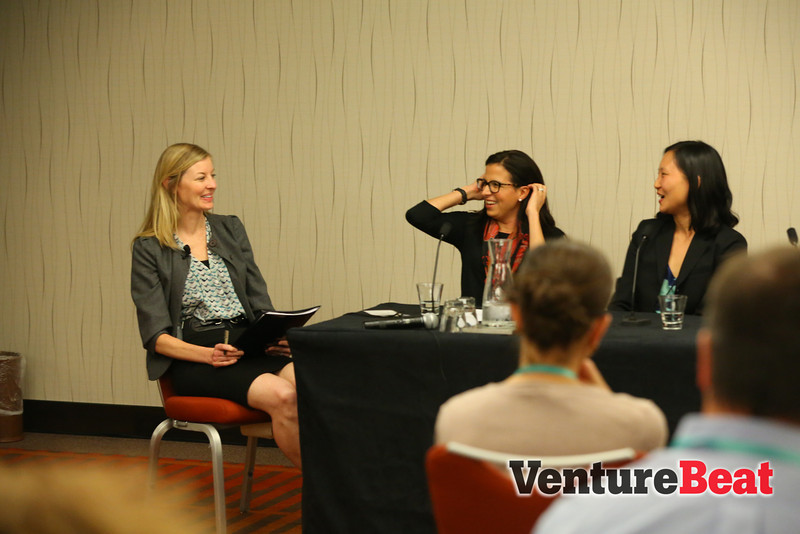
Four female entrepreneurs came together at Healthbeat today for a panel titled “By Women, For Women: Building Technologies for the Chief Medical Officer of the Home.” Each of these women has a child under the age of four and each is building technology that can cut down on the costs and fears associated with family medicine.
[aditude-amp id="flyingcarpet" targeting='{"env":"staging","page_type":"article","post_id":742169,"post_type":"story","post_chan":"none","tags":null,"ai":false,"category":"none","all_categories":"business,entrepreneur,","session":"D"}']A study by the Department of Labor found that women make approximately 80 percent of health care decisions for their families and are likely to be the care giver when a family member falls in. Despite this fact, only four percent of health care CEOs are women. There is a huge opportunity to improve the experience of care for pregnant women and mothers and bridge the gender gap between the people making consumer products and the people using them.
“I started thinking about this company when starting a family of my own,” said Leah Sparks, cofounder and CEO of Wildlflower Health. “I worked in health care for a decade, but pregnancy was the first time I dealt with the health care system as a patient. It opened my eyes to gaps in terms of resources available and risks. When I first started talking about my idea for Wildflower, the response from VCs was it was a niche market. Women represent half the population and pregnancy is the number one driver of hospital costs a year — does that sounds like a niche to you?”
AI Weekly
The must-read newsletter for AI and Big Data industry written by Khari Johnson, Kyle Wiggers, and Seth Colaner.
Included with VentureBeat Insider and VentureBeat VIP memberships.
Wildflower Health is a mobile platform that helps pregnant women track milestones customized to their due date, be aware of risk factors, and take personalized actions. The app has already reached 15,000 pregnant women and can significantly cut down on doctor visits by helping women monitor their pregnancy and feel like they are in control of the process.
The costs and fears don’t end once a baby is born. Quite the opposite. Infants and toddlers present whole new sets of health concerns. After spending hours and hours in the pediatricians office with her now two-year-old, Amy Sheng set out to create more convenient alternative.
“Anyone who has children knows that pit you get in your stomach when your child is sick,” she said. “The options are either to take your kid to the doctor during the work day, or go after hours to an urgent care clinic or ER. Neither of those options are good. People want to be empowered in their home to see what is wrong with their kid, to collect data and make an informed decision about whether it is serious enough to see a doctor.”
Sheng is a cofounder of CellScope, a company that makes a smartphone attachment that can snap images of middle ears. Sheng said and there are 25 million ear infection related visits a year in the U.S and ear infections are one of the most common reasons why kids go to see doctors. Using the CellScope, parents can capture photos of their children’s’ ear and transmit it to a doctor to be diagnosed and treated remotely, or brought in for a visit if necessary.
Wildflower Health and CellScope strive to cut down on the time women spend in clinical environments and provide the tools they need to manage their health from home. This not only cuts down on cost and anxiety levels, but also has significant implications for the position of women leaders. Having children is frequently cited as an obstacle to women advancing their careers. Maternity leave is undesirable for employers who don’t want to disrupt workflow and many mothers struggle to balance a time-consuming professional life with the demands of young children. Discrimination against pregnancy and mothers is an issue that contributes to the ‘gender problem’ in the business world, and any tool that can save women time stands to support their professional success.
“I had a healthy pregnancy and yet there were three or four times when I dealt with major issues during the work day,” Sparks said. “Anything that empowers women to deal with their health issues in the work place will help eradicate this myth that you can’t be a mom and a founder. Companies should want these technologies too, because they are in a talent war and want to keep women employees as happy, healthy, and productive as they can. Reducing complications and doctor visits can help do that.”
[aditude-amp id="medium1" targeting='{"env":"staging","page_type":"article","post_id":742169,"post_type":"story","post_chan":"none","tags":null,"ai":false,"category":"none","all_categories":"business,entrepreneur,","session":"D"}']
Photo Credit: Michael O’Donnell/VentureBeat
VentureBeat's mission is to be a digital town square for technical decision-makers to gain knowledge about transformative enterprise technology and transact. Learn More
